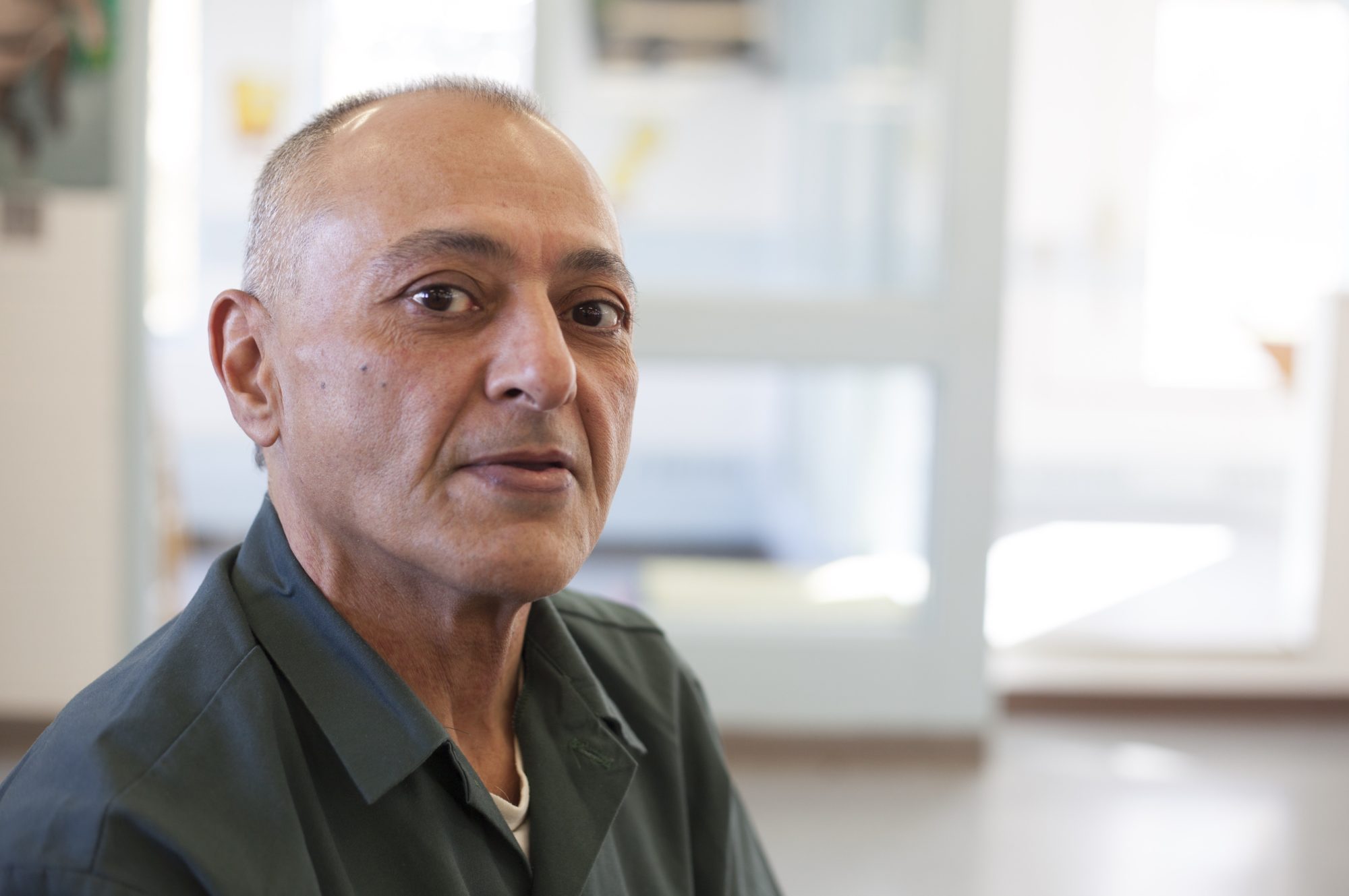This Grandfather Was Granted Parole in 2018. Why Is He Still in Prison?
Imprisoned as a teen, Amer Zada is now eligible for release but can’t find approved housing—and a proposed law could make the problem worse.

Amer Zada was granted parole on Feb. 21, 2018, after serving almost 40 years for sexual abuse and murder, crimes he maintains he did not commit. Now 57, Zada has not been free since he was a teenager. He was arrested at 17 and convicted in Rockland County, New York, at 18. But more than a year after he was granted parole, Zada remains incarcerated.
That’s because there’s virtually nowhere he’s allowed to live. Under the New York State Sexual Assault Reform Act (SARA), people who are on parole or other types of community supervision for certain sex crimes can’t live within 1,000 feet of a school. Until the Department of Corrections and Community Supervision (DOCCS) approves a SARA-compliant home, Zada will remain in prison.
Over the last year, multiple housing plans that Zada submitted were rejected, including proposals to live in New York and with or near family in Vermont, he told The Appeal.
The Department of Corrections and Community Supervision declined to comment on Zada’s case.
Advocates say there are potentially hundreds of other New York prisoners like Zada, eligible for release but kept in prison or residential treatment facilities due to a lack of approved housing—and they could soon have even fewer housing options. State Senate Bill 1172 and its companion in the Assembly aim to further restrict the places where people convicted of sex crimes could live.
The current law prevents people with sex offenses from living near public or private elementary, parochial, intermediate, junior high, vocational, or high schools. The bill, introduced this year by Senator George A. Amedore Jr. and Assemblymember Patricia Fahy, would create the same 1,000-foot radius around any childcare provider, preschool, pre-kindergarten, or kindergarten.
“This bill will help ensure that our youngest, most vulnerable children are protected from dangerous predators,” Amedore said in a statement after it passed the full Senate in 2018. It has repeatedly passed the Senate, but the Assembly bill has not moved out of committee. Amedore, who also introduced a bill this year that would charge people with homicide if they transport or sell opiates that cause a death, did not respond to a request for further comment.
It makes the impossible task that much more impossible.
Will Page Legal Aid Society
The existing residency restrictions already eliminate nearly all housing in Manhattan, the Bronx, Brooklyn, and Queens, according to a recent report by the Fortune Society and 16 other criminal justice organizations. As New York expands its universal pre-kindergarten program, the bill would further limit what meager housing is available, notes Will Page, a staff attorney with the Legal Aid Society. While some pre-K programs are in elementary schools, which are already subject to SARA, others are housed in private homes or community centers. There are more than 2,000 daycares operating in Brooklyn alone, according to a search on the Office of Children and Family Services website.
“It makes the impossible task that much more impossible,” said Page.
Even with Democrats controlling the legislature and in the governor’s office, expanding SARA remains a concern, said Page. Last year, a proposal similar to Amedore’s was included as part of the 2019 budget submitted by Governor Andrew Cuomo.
“This action will forbid these predators from stepping within 1,000 feet of our schools and help secure neighborhoods across the state,” Cuomo said at the time.
The budget proposal was ultimately dropped after it was condemned by several legal organizations. But the animus behind it hasn’t waned.
“The banishment of people with sex offense crimes is not a party issue,” Page said.
Still a teenager when he entered prison with a 25-year-to-life sentence, Zada said older prisoners mentored him and helped him navigate his incarceration. The terrain was particularly treacherous, Zada said, because he was labeled a rapist.
“I was actually pretty much thrown into this living hell,” said Zada. “They say everything happens for a reason. I don’t know why this happened to me.”
Over the course of his sentence, Zada faced the parole board seven times before he was finally granted parole. According to his letter to the board, he was denied each time because he refused to admit guilt for a crime he said he didn’t commit. His parole packet included letters of support from his son, Amer Zada Jr., and his ex-wife. Zada’s son, now 37 and a father of four, told The Appeal he has never known his father as a free man. About 30 years ago, they spent one night together in a trailer during a family visit.
“As his son, I cannot express in words how I would feel spending time with my father outside of [the] prison environment,” the younger Zada wrote to the parole board. “I missed out on knowing my father, and making memories with him.”

The Jeffrey Deskovic Foundation for Justice, where Zada is a client, also supported his application for parole. The foundation works to exonerate people who have been wrongly convicted.
“Either they won’t rent to him, or else parole won’t allow him to stay at places that were willing to accept him,” said Jeffrey Deskovic, its founder, who was exonerated after being wrongly convicted in New York. “So in other words, it’s like he really didn’t get paroled.”
Once Zada is released, he’ll have several pages of requirements and restrictions to abide by, which include attending counseling, submitting to polygraph exams, and a ban on playing “internet enabled” games like Pokémon Go. Failure to comply could mean arrest and imprisonment. Zada said he isn’t worried about complying with the conditions; he simply wants to go home. But first Zada must overcome the SARA restrictions and the hurdles they place between him and freedom.
“I’m a grandfather,” he said. “I just want to get out on parole so I can spend the rest of my life with my children, who are full grown men now, and my grandchildren, who are still children.”
It is not unusual for people convicted of sex crimes in New York to be held past their release dates, according to advocates. Attorneys with Legal Aid, which has litigated challenges to SARA, say the precise number is difficult to obtain because DOCCS has been reticent to share the information. The Appeal sought the data from DOCCS and was instructed to file a public records request.
At issue are both the residency restriction itself and the state’s interpretation of it. Advocates say the state has applied SARA restrictions in the harshest ways possible, even against those the law was never intended to affect.
Up to now, it’s been full steam ahead from the attorney general’s office.
Elon Harpaz Legal Aid Society
Raymond Negron, for instance, was convicted of sexual abuse more than 20 years ago, served his sentence, and completed parole. He later returned to prison on a burglary charge, served 11 years, and was granted parole on May 4, 2016. He planned to live with his sister, according to a brief filed by Legal Aid in January 2018.
But Negron was not released until more than a year later, according to the brief. Though he was not on parole for a sex offense, the state maintained that he was still subject to residency restrictions due to his prior conviction. In February, a New York appellate court ruled in Negron’s favor, finding that he should not have to abide by SARA. The attorney general is appealing the decision, noting that another appeals court ruled in a different case that SARA restrictions would apply to someone in Negron’s situation. Negron’s case will now be heard by the Court of Appeals, New York’s highest court.
“Up to now, it’s been full steam ahead from the attorney general’s office fighting, clawing every inch of the way to defend the most draconian interpretation of the SARA law imaginable,” said Elon Harpaz, an attorney with Legal Aid.
Earlier this year, Michigan Attorney General Dana Nessel condemned residency restrictions as “contrary to the desired goals of rehabilitation, stability, and reintegration into community life.”
Harpaz hopes that New York Attorney General Letitia James, who was elected to her first term in November, will follow Nessel’s lead. “It would be important, useful, correct, and right for her to take a position similar to the one taken by the attorney general in Michigan,” said Harpaz, who has clients with housing they aren’t allowed to move into. “[It’s] just a tragic situation.”
